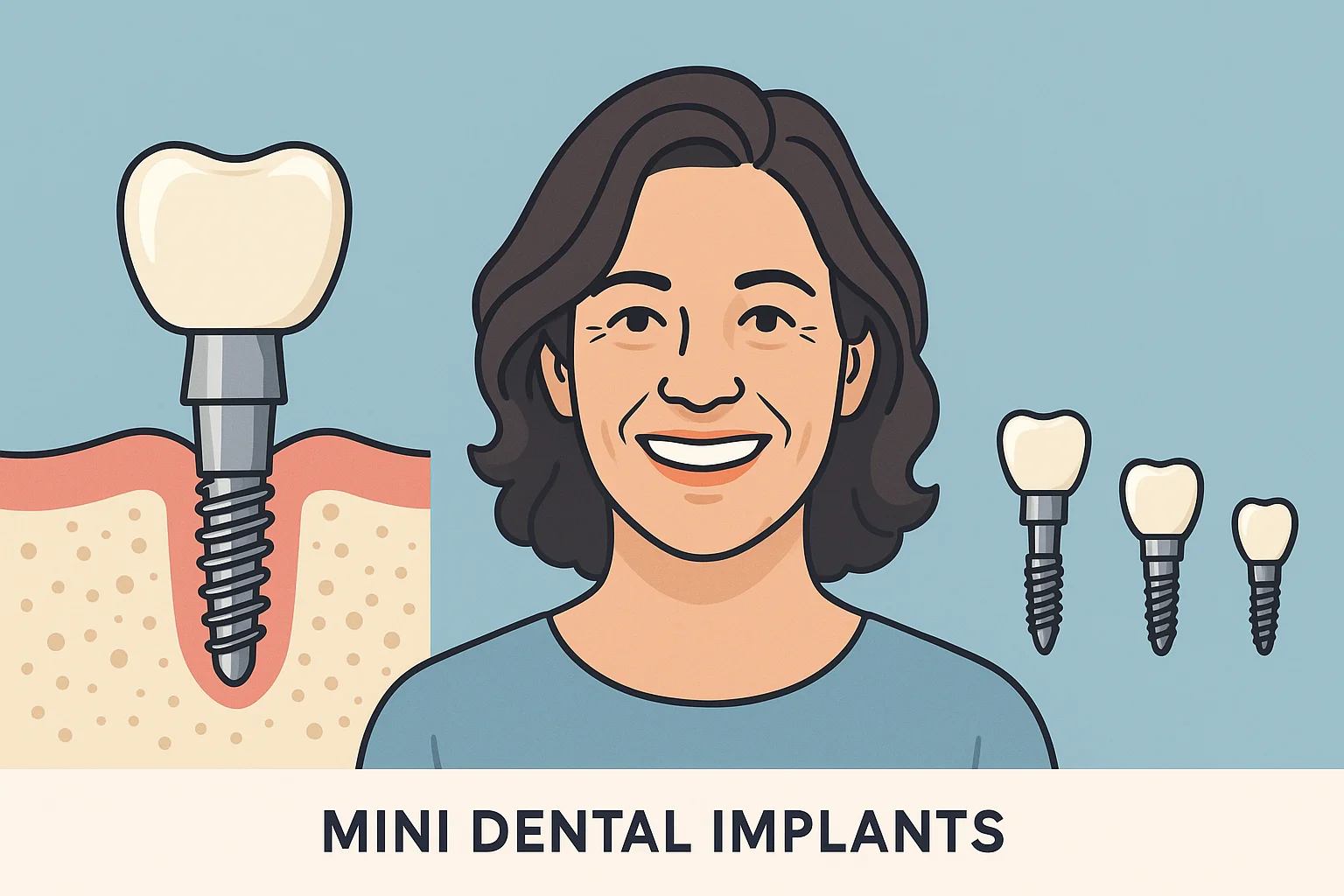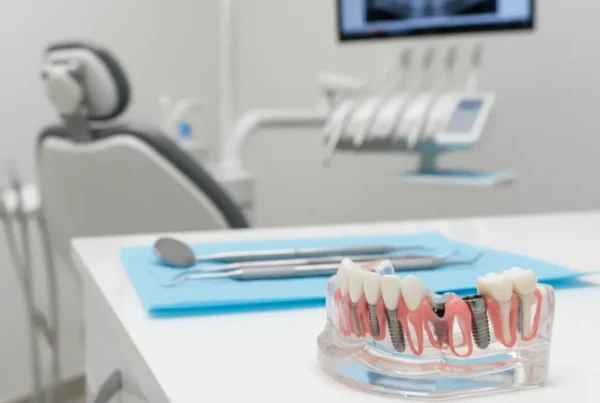Mini dental implants have rapidly become a game-changing solution in the world of restorative dentistry. These small but sturdy devices serve the same purpose as traditional implants—replacing missing teeth or stabilizing dentures—but with a less invasive, more affordable approach. Their compact size, typically under 3mm in diameter, makes them especially useful in patients with narrow jawbones or limited space. And because they require less bone for placement, they often eliminate the need for bone grafting, making them accessible to a wider group of patients.
As the demand for minimally invasive and cost-effective dental solutions grows, mini implants are gaining popularity among both dentists and patients. Whether you’re missing a single tooth or struggling with ill-fitting dentures, these implants offer a stable, immediate fix with shorter recovery times and lower financial commitment. At Grand Prairie Family Dental, we’re proud to offer mini dental implants as part of our personalized, patient-first approach to smile restoration.
Key Benefits of Mini Dental Implants
Mini implants offer a suite of advantages that go beyond their size. Because the placement procedure is less complex, there’s less trauma to the surrounding bone and gum tissue. This means less discomfort for the patient, fewer complications, and significantly reduced healing time. In many cases, patients can return to their regular routines the very next day—a stark contrast to the weeks or even months of downtime required for traditional implants.
Cost is another major benefit. Mini implants typically cost 30–60% less than traditional implants, making them an appealing option for patients on a tighter budget. They’re also excellent for those who prefer to avoid multiple surgeries, extensive healing, or the need for bone grafts. The affordability doesn’t come at the expense of effectiveness, either—mini implants are durable, reliable, and able to support crowns, bridges, or full dentures.
Here are the standout advantages of mini dental implants:
- Minimally invasive procedure: Placement requires a small pilot hole, often without the need for stitches or incisions.
- Faster recovery: Most patients experience minimal discomfort and are back to normal within 24–48 hours.
- Lower cost: On average, mini implants are significantly more affordable than traditional implants.
- No bone grafting needed: Suitable for patients with reduced bone volume who are not candidates for traditional implants.
- Immediate loading: In many cases, prosthetics like crowns or dentures can be attached the same day.
These benefits make mini dental implants an ideal choice for patients who need quick, effective, and long-lasting results. Their ease of placement and affordability open the door to more people than ever before.
Ideal Applications for Mini Dental Implants
Mini dental implants aren’t just convenient—they’re versatile. Their small size allows them to be used in a variety of clinical scenarios where traditional implants may not be feasible. This includes areas with limited space, such as the front of the mouth or in between tight gaps where standard implants simply won’t fit. They’re also ideal for stabilizing lower dentures, which are notoriously difficult to keep in place due to jaw shape and bone loss.
For patients who cannot or do not wish to undergo bone grafting, mini implants offer a solution that doesn’t sacrifice stability or aesthetics. They are also commonly used in cases where a permanent restoration is needed quickly—such as following a tooth extraction. In these instances, a mini implant can be placed and restored on the same day, providing immediate function and cosmetic relief.
Common applications include:
- Stabilizing loose lower dentures: Providing secure anchorage that improves speech and eating ability.
- Replacing narrow or small teeth: Particularly useful for lower incisors and upper lateral incisors.
- Supporting bridges: Especially in areas where bone density is low or space is limited
- Avoiding grafting procedures: A great option for patients who prefer a non-surgical path or have medical limitations.
These diverse applications make mini implants a valuable tool in the restorative toolbox. At Grand Prairie Family Dental, we evaluate each patient’s anatomy, lifestyle, and preferences to determine the most appropriate use of mini implants for their situation.
Comparing Mini Implants to Traditional Implants
Mini dental implants and traditional implants serve similar purposes but have distinct differences that affect treatment decisions. The most obvious difference is their size: mini implants are less than 3mm in diameter, while traditional implants are generally 3.5mm or larger. This difference makes minis easier to place and less invasive, often without needing to cut the gums or insert sutures.
However, this smaller size also means that mini implants may not be as strong under heavy bite forces. While they’re excellent for stabilizing dentures or replacing small teeth, they may not be the best choice for molars or full arch restorations. Traditional implants are still the preferred option for high-pressure areas and for patients seeking the longest-lasting solution possible.
Here are some key comparison points:
- Size and placement: Mini implants are thinner and can often be placed in a single visit, while traditional implants require a longer multi-stage process.
- Recovery time: Minis typically heal in a few days; traditional implants may need several months.
- Cost difference: Mini implants can cost up to half as much.
- Durability: Traditional implants have a longer clinical track record and may last longer under heavy use.
- Suitability: Mini implants are ideal for patients with limited bone, space, or time.
Both types of implants have their place, and the right choice depends on your oral health, goals, and anatomy. We’re here to help you make the most informed decision possible.
 What to Expect: Procedure and Recovery
What to Expect: Procedure and Recovery
One of the most attractive aspects of mini implants is the speed and simplicity of the procedure. After a comprehensive exam and diagnostic imaging, the dentist will numb the area and use a tiny drill to create a pilot hole in the jawbone. The implant is then gently screwed into place. Since the procedure is so minimally invasive, it typically takes less than an hour and doesn’t require incisions, stitches, or a lengthy healing period.
Many patients are surprised at how comfortable and quick the experience is. Unlike traditional implants, which often require weeks or months between placement and restoration, mini implants can often support a crown, bridge, or denture the same day. Post-operative discomfort is generally mild and can be managed with over-the-counter pain relievers. Soft foods are recommended for the first few days.
Here’s a breakdown of the recovery process:
- Day of surgery: Expect some mild tenderness and swelling; avoid hard foods and follow care instructions.
- Days 2–5: Most discomfort fades; continue using a soft-bristled toothbrush and avoid pressure on the implant.
- After one week: Most patients feel completely back to normal.
- Follow-up: Your dentist will monitor the implant’s integration and adjust your prosthetic if necessary.
Overall, the process is much less intimidating than many expect—and the results can be life-changing.
Personalized Care at Grand Prairie Family Dental
At Grand Prairie Family Dental, we understand that no two patients are alike. That’s why we take a personalized approach to every mini implant case, starting with a detailed consultation that includes 3D CBCT scans, a review of your health history, and a one-on-one discussion about your goals. This thorough planning ensures precise placement, proper healing, and results that last.
We also offer sedation options for anxious patients, in-house membership savings, and flexible financing to make sure your path to a healthier smile is as smooth and stress-free as possible. Our compassionate team takes the time to walk you through each step and answer all your questions, so you feel supported and confident throughout your treatment journey.
What you can expect from our care:
- Advanced diagnostics and planning: We use CBCT imaging and digital impressions to ensure precision.
- Customized treatment plans: Tailored to your anatomy, goals, and financial preferences.
- Sedation options: Oral and nitrous sedation for added comfort during your procedure.
- Post-op care and support: Regular follow-ups and long-term maintenance for peace of mind.
With a track record of successful outcomes and happy patients, Grand Prairie Family Dental is proud to be your trusted partner in restoring your smile.
We believe everyone deserves a complete, healthy smile without financial stress. We understand that dental implants are an investment, which is why Dr. Behrooz Khademazad offers personalized treatment plans and financing options.
Here’s how we do it:
- Comprehensive Evaluation: We assess your oral health and discuss your smile goals.
- Transparent Pricing: We provide a detailed breakdown of costs with no hidden fees.
- Flexible Financing: We offer various payment plans to fit your budget.
So, schedule your implant consultation with Dr. Khademazad today. Stop hiding your smile or struggling with ill-fitting dentures and instead enjoy the confidence and comfort of a permanent, natural-looking solution.
FAQs
How long do mini dental implants last?
With proper care, mini implants can last 10–15 years or more. Their longevity depends on factors like placement location, bite pressure, and oral hygiene habits.
Can I get mini implants if I’ve lost a lot of bone?
Yes. One of the biggest advantages of mini implants is that they require less bone for placement, making them an ideal option for patients with bone loss.
Is the mini implant procedure painful?
Not at all. Most patients report only minor discomfort during the procedure, similar to having a filling. Post-op recovery is quick and easily managed with OTC pain relievers.
Related Services






